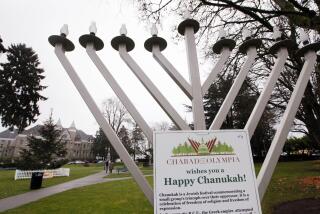Circuit-Riding Rabbi in Upstate N.Y. : Circumcision Preserves an Ancient Jewish Pledge
ALBANY, N.Y. — Rabbi Paul Silton travels eastern Upstate New York to help Jews fulfill an ancient pledge their ancestors made to circumcise their sons as a sign of devotion to God.
Fifty to 100 times a year, the circuit-riding rabbi visits a Jewish home to carry out a festive ceremony that enters a baby boy into the holy covenant that Jews believe was established about 3,600 years ago between God and Abraham.
As the only mohel --the Hebrew term for a person who carries out Jewish religious circumcisions--between the New York City area and Rochester at the other end of the state, Silton takes his responsibility seriously. He said he missed the birth of his twin daughters--the last of his seven children--to perform an out-of-town circumcision three years ago.
“Circumcision is extremely important from a religious point of view, it’s a very basic tenet of Judaism,” said Silton, a 42-year-old Albany rabbi who has been performing ritual circumcisions since 1968. “God wants the Jewish people to live their traditions to the fullest.
Preserving Tradition
“By helping preserve the tradition of circumcision, I see myself as a person who can show Jewish people how beautiful and joyous the Jewish tradition can be.”
Circumcision--the surgical removal of the fold of skin that covers the end of the penis--dates to prehistoric times among many peoples. It was often performed at important times of passage in a boy’s life, such as shortly after birth, at puberty or just before marriage.
The procedure is routinely performed on some baby boys born in the United States and on babies in other nations because many doctors believe that it guards against infections and diseases. Other doctors contend that it serves no medical purpose.
Jews practice circumcision because the Bible teaches that God promised to give Abraham’s descendants the land of Israel for all time if they would pursue justice, mercy, ethical conduct and obey the laws of God. As a sign of allegiance to that covenant, the Bible says God commanded: “Every male among you, throughout your generations, shall be circumcised when he is 8 days old.”
About 200 in U.S.
Silton is one of about 200 mohels in the United States, according to Eugene Cohen, director of the Brit Milah Board of America. Brit means covenant and milah means circumcision in Hebrew.
About half the mohels in the United States live in the New York City area, where 1.7 million of the 5.7 million Jews in the nation live. Mohels outside New York City normally cover broad geographic areas to meet the needs of Jews who want to keep the ancient custom of the brit milah alive.
“Most Jews don’t use a mohel anymore, they use a doctor for circumcisions, they trust a doctor more,” said Cohen, whose group seeks to preserve the tradition of mohels and promote the proper religious and medical skills.
By using a Jewish doctor to perform the circumcision and having a rabbi lead parents and guests in the proper prayers, the procedure still carries out the brit milah.
Religious Aspects
“Most Jews--even those not particularly religious--want the circumcision to have some religious aspects because it’s such an important tradition,” Silton said.
He said it’s a “very meaningful and significant” experience for everyone involved and “a celebration.” Parents invite friends and relatives--sometimes a handful and sometimes dozens--to pray, sing and dance at the ceremony and then share a festive meal. The baby boy is formally given his Hebrew name as prayers are said.
“The ceremony is just wonderful,” said Beth Goldberg, who recently invited 40 people--about half of them non-Jews--to her home in the Syracuse suburb of Manlius for the brit milah Silton performed on her only son, Andrew.
Jews have kept the ceremony of circumcision alive even when oppressors tried to outlaw it. Some Jewish mothers and their circumcised babies were killed by the ancient Greeks who ruled Israel and tried to stamp out the brit milah. When the Romans tried to outlaw Jewish circumcisions, it helped spark a Jewish revolt.
Identifying Jews
In modern times, the Nazis used circumcisions as one way of identifying Jewish men and boys who tried to pass themselves off as Christians.
Rabbinical sages have speculated that God chose circumcision as the physical mark of his covenant because “by marking the organ of procreation, this emphasizes the covenant must be passed from generation to generation,” Silton said.
More to Read
Sign up for Essential California
The most important California stories and recommendations in your inbox every morning.
You may occasionally receive promotional content from the Los Angeles Times.










